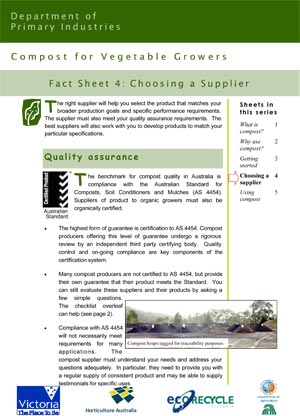|
|
This is the fourth in a series of five fact sheet developed for vegetable growers in 2003 – 2004. These sheets will provide you with information about composting, compost products and how to best use them to suit your needs. The right supplier will help you select the product that matches your broader production goals and specific performance requirements. The supplier must also meet your quality assurance requirements. The best suppliers will also work with you to develop products to match your particular specifications.
Quality Assurance :
Choosing your Compost Supplier : Whether you are interested in trying compost for the first time or require a regular supply, the following checklists will give you the confidence to choose the right supplier to work with.
Suppliers of compost products should be able to :
Composted products often need to be developed and refined with some degree of ‘trial and error’, so it is important to establish a relationship with a reputable supplier that you feel you can work with for mutual benefit. Acknowlegements : Peter Franz, Department of Primary Industries (Victoria), Knoxfield, for providing statistical advice for the persistence of enteric bacteria on leafy vegetable trials. Dr Graham Hepworth, from the Statistical Consulting Centre at The University of Melbourne, for experimental design assistance, analysing data and providing statistical advice with regards to the persistence of enteric bacteria in poultry litter trials. Francha Horlock, Janet Tragenza (Department of Primary Industries (Victoria), Knoxfield) and Iphie Papapetrou (Box Hill Institute, Victoria) for providing technical advice and assistance. Agnes Tan and Nela Subasinghe from The Microbiological Diagnostic Unit, Department of Microbiology and Immunology at The University of Melbourne for microbial diagnostic advice and services. Dr Barry Macauley from the Department of Microbiology at Latrobe University provided valuable assistance in the interpretation of the experiments examining the reduction and persistence of enteric bacteria during aging of poultry litter. This work was funded by: Horticulture Australia Pty Ltd, Department of Primary Industries (Victoria) and the Australian Vegetable Growers through the AUSVEG levy with voluntary contributions from: VegFed (NZ), CL & AK Warlan, Lightowler Fowl Manure Pty Ltd, TD & EC Ould Pty Ltd |
||||||||
|

